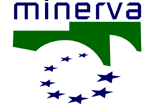| About Minerva | ||
| Structure | ||
| NPP | ||
| Good practices | ||
| Competence centres | ||
| Digitisation guidelines | ||
| Enlargement | ||
| Events | ||
| References | ||
|
Publications |
||
Path: Home |About Minerva Plus
MINERVA Plus
Starting from February 2004, Minerva Project is enlarged to MINERVA Plus initiative, already approved by the European Commission in the 6FP.Contract number: 507083 MinervaPLUS intends to enlarge the existing thematic network
of European Ministries to discuss, correlate and harmonise activities
carried out in digitisation of cultural and scientific content,
for creating an agreed European common platform, promoting recommendations
and guidelines about digitisation, metadata, long-term accessibility
and preservation. Key issues The key objectives are to:
Technical approach The technical approach followed to achieve the previous objectives includes activities aiming to:
Expected achievements/impact The project has the overall objective to promote the creation of National Committees to discuss, correlate and harmonise activities carried out in the sector, establishing contacts with international organisations, associations, other networks, international and national projects involved in the sector of digitisation of cultural and scientific content. For its nature, it will not carry out scientific research, but will rely on existing actions to identify and integrate good practices in a pan-European framework. A first effect of this proposed coordination is an integration of fragmented and isolated research groups towards agreement on a common, even if minimum, set of recommendations and a technical platform across sectors all over Europe. The project is based on the principle of embeddedness in national digitisation activities and this can only be guaranteed by the direct involvement of the national Ministries of Culture who participate in Minerva and MinervaPLUS. The high added value of the project consists of its effectiveness to developagreed evolutionary strategies for the digitisation of cultural contents, based on commonly shared objectives (i.e. the implementation of the Lund principles) and then to direct and focus the national investments towards these objectives. The project includes detection of users needs and regular collection of feed-back through Users Groups, but keeps a top-down approach in its close connection with national cultural and socio-economic policies: it is by definition open to the collaboration and integration with other users-led “bottom-up” networks, seeking support from public authorities and integration with national policies. It is clear that apart the contribution requested to the European Commission for animating the group, there is a large amount of efforts– estimated in several person years – which will be mobilised by the partner Ministries, and by other Governments which will be involved in the discussion, therefore providing a clear example of real European added value, where the common activities supported by the European Commission are finalised to develop an integrated harmonised approach to the digitisation policy. |
|
|||||||||||||||||
|
Copyright Minerva Project 2004/05, last revision 2004-12-21, edited
by Minerva Editorial Board.
URL: www.minervaeurope.org/whatis/minervaplus.htm |
 |

